

The Role of News on Facebook. On Facebook, the largest social media platform, news is a common but incidental experience, according to an initiative of Pew Research Center in collaboration with the John S. and James L.

Knight Foundation. Overall, about half of adult Facebook users, 47%, “ever” get news there. That amounts to 30% of the population. Most U.S. adults do not go to Facebook seeking news out, the nationally representative online survey of 5,173 adults finds. Instead, the vast majority of Facebook news consumers, 78%, get news when they are on Facebook for other reasons. However, the survey provides evidence that Facebook exposes some people to news who otherwise might not get it. Some digging by The New York Times strikes a blow against those skeezy mugshot sites. Over the weekend, the Times published David Segal’s look at mugshot sites — the ones that gather publicly available mugshots from around the country, publish them with the arrestee’s name and charge attached, and then offer to take them down for the right amount of money.
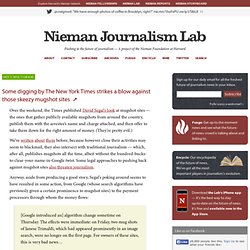
(They’re pretty evil.) We’ve written about them before, because however close their activities may seem to blackmail, they also intersect with traditional journalism — which, after all, publishes mugshots all the time, albeit without the hundred-bucks-to-clear-your-name-in-Google twist. Some legal approaches to pushing back against mugshot sites also threaten journalism. Anyway, aside from producing a good story, Segal’s poking around seems to have resulted in some action, from Google (whose search algorithms have previously given a certain prominence to mugshot sites) to the payment processors through whom the money flows: In Mark Zuckerberg's world, lying is the only way to be yourself. 27inShare Jump To Close I love Facebook, don’t you?
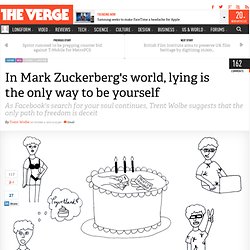
Tumblr Is Not What You Think. Editor’s note: Adam Rifkin is co-founder and CEO of PandaWhale, an online network of interesting things and people.
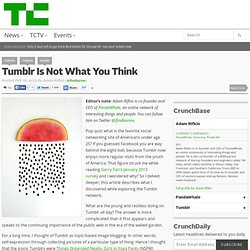
You can follow him on Twitter @ifindkarma. Pop quiz: what is the favorite social networking site of Americans under age 25? If you guessed Facebook you are way behind the eight-ball, because Tumblr now enjoys more regular visits from the youth of America. That figure struck me while reading Garry Tan’s January 2013 survey and I wondered why? So I delved deeper; this article describes what I discovered while exploring the Tumblr network. What are the young and restless doing on Tumblr all day? For a long time, I thought of Tumblr as topic-based image blogging: In other words, self-expression through collecting pictures of a particular type of thing. ALL WRONG. Tumblr actually became huge because it is the anti-blog. How Do You Like Your Content? Depends On The Device You’re Using (Infographic)
User Engagement Follows Good Content, Not Ads. David In a recent AdAge article, Chartbeat presented interesting data about which parts of a content page receive the highest user engagement.

A key take-away from their study was that the area of the page below the fold has higher engagement than many realize, higher in fact than areas of the page typically considered premium by advertisers (like top center). A visual look back at digital publishing in 2012. What kind of blog would Lean Back 2.0 be without an end-of-year list?
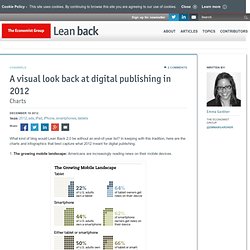
In keeping with this tradition, here are the charts and infographics that best capture what 2012 meant for digital publishing. 1. The growing mobile landscape: Americans are increasingly reading news on their mobile devices. The Cookie Has Five Years Left Says Merkle’s Paul Cimino. Since being acquired in September 2012, Paul Cimino’s Brilig Data Exchange serves not only its own customer base but also that of its new owner, Merkle, and all of the first- and third-party data it looks to leverage on behalf of its Merkle clients across marketing campaigns.
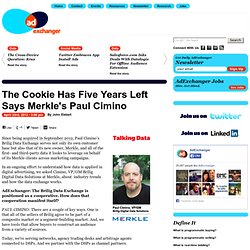
In an ongoing effort to understand how data is applied in digital advertising, we asked Cimino, VP/GM Brilig Digital Data Solutions at Merkle, about industry trends and how the data exchange works. Stanford privacy advocate gives up on ‘Do Not Track’ group. Jonathan Mayer is a Stanford graduate student best known for revealing last year that Google had hacked privacy settings in order to place advertising on Apple’s iPhone.
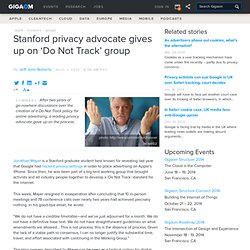
Since then, he was been part of a big-tent working group that brought activists and ad industry people together to develop a ‘Do Not Track’ standard for the internet. This week, Mayer resigned in exasperation after concluding that 10 in-person meetings and 78 conference calls over nearly two years had achieved precisely nothing.
In his good-bye email, he wrote: “We do not have a credible timetable—and we’ve just adjourned for a month. We do not have a definitive base text. The slow process described by Mayer can be seen as a tactical victory for digital advertising industry groups, which oppose efforts to limit the data collection that fuels their business. FTC hits Google with $22.5 million fine over Safari hacks. The Federal Trade Commission today confirmed that it has imposed a record-breaking fine on Google over the search giant’s decision to circumvent privacy settings on the Apple’s Safari browser.

Daily chart: Post versus posts. Daily chart: Post versus posts.